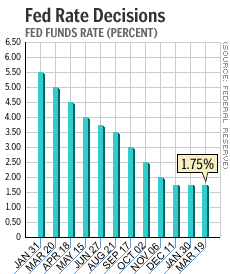
NEW YORK (CNN/Money) -
With violence in the Middle East spinning out of control and Iraq calling for an Arab embargo of oil exports to the United States, some observers worry about a return to the mid-1970s, when an oil shortage pushed inflation through the roof and burdened the U.S. economy.
Indeed, the price of a barrel of crude oil, hovering at around $17 in November, has shot up to more than $27. But most economists doubt that the surge will be as disastrous as it was in the 1970s, in part because the Federal Reserve is not likely to jack up short-term interest rates as it did then.
"The Fed may be looking at oil prices as a reason for the economy to falter and not a reason for it to overheat, so they won't want to raise rates yet," said Gary Thayer, chief economist at A.G. Edwards & Sons.
Thayer pointed out that a similar situation existed in 1990-91, when oil prices spiked as a result of the Gulf War. The Fed responded by slashing interest rates in one of the most aggressive campaigns in its history.

Not only are higher oil prices generally depressing to consumer confidence, they raise prices across the board for consumers and businesses, slowing down spending and economic growth. Higher oil prices in 1999-2000 weighed on spending and helped bring on the U.S. economy's first recession in a decade.
To fight that recession, the Fed cut its target for short-term interest rates 11 times in 2001. It decided to leave rates alone at its first two policy meetings in 2002 and recently declared that the risks to the economy were balanced between a risk of inflation and a risk of weakness.
Some economists think the Fed will start to raise rates relatively quickly this year to fight inflation. Others -- citing recent data showing sluggish activity in manufacturing, retail sales, and other areas -- think the recovery will be so sluggish that the Fed will be able to leave rates lower for longer.
"The Fed will raise rates, but they're aware that higher energy prices might do some of their job," said Anthony Chan, chief economist at Banc One Investment Advisors. "And inflation is not so high that they need to panic."
Still, the price of oil will likely increase, no matter what happens in the Middle East. The economy's rebound from its mild recession will increase demand for oil and drive prices up in 2002. When the price of a barrel of crude oil fell below $20 last year, the Organization of the Petroleum Exporting Countries (OPEC) decided to cut production, which will also support prices this year.
Driven by concerns about violence in the Middle East and Iraq's embargo threat, the price of a barrel of oil for May delivery spiked above $28 in New York trading and above $27 in London trading Tuesday, the highest levels in six months.

But prices retreated a bit on Wednesday, and many analysts and economists pointed out that prices had likely gotten ahead of themselves, ignoring the low risk of an oil embargo and rising on fear instead of fundamentals.
"[The price gain] is entirely psychological," John Lichtblau, chairman of the Petroleum Industry Research Foundation, told CNNfn's Before Hours program. "Nothing has been done. Saddam Hussein advocated the use of Arab oil exports as an instrument to influence the Arab/Israeli situation, but he himself is not in a position to do anything about this, and there's no indication that other Arabs will go along with this."
While the price gain may be psychological, there's no telling how long it will linger. After all, even if hostilities end in the West Bank, there's still the growing threat of a U.S.-led military action in Iraq.
"The political volatility has added a $4-to-$5 per barrel war premium to the price of crude," said Merrill Lynch oil industry analyst Steven Pfeifer. "That will stay in the price as long as we have hostilities in the Middle East. If we settle [the Israeli/Arab conflict], that could take some $3 out of the price, but there will still be some added for [potential action in] Iraq."
| |
 Related links
Related links
| |
| | |
| | |
|
Still, such a price hike won't likely have much of an impact on the U.S. economy, which is more diversified and less dependent on oil than it was in the mid-1970s.
"If you look at economic models of the impact of oil prices, a $5 oil price increase only takes a couple of tenths of a percent off [gross domestic product] growth," Ethan Harris, co-chief U.S. economist at Lehman Brothers, told CNNfn's Market Call program. "Things have to get a lot worse before this becomes a major shock to the U.S. economy."
"It suggests moderate growth in the year ahead, but I don't think there's much risk of a 'double-dip' recession," Harris added.

|

